You can make money from your website. Today it's easy to add advertising, but I show you which work best, and ways to target to get more clicks.
Monday, December 26, 2005
Contextual Ad Sweet Spot
To me, this represents achieving a 3 to 1 return on investment.
Whatever manner you use to generate traffic to your site, you'll agree you're doing well when you're making a profit. Many people don't include the "time" they spend working to get there. And, I think that's okay. Sure, your time counts as something, but don't beat yourself up if you find yourself taking long hours working to turn a profit.
Before you get feeling all warm and cozy, let me tell you that the better part of this business is duplication. You simply find your system (i.e. one that works for you), and keep duplicating your efforts.
The second part is the hardest; that of finding the right niche/keyword/content/webpage combination. However, if you simply copy someone's success, you will have the same results - given you meet the same parameters for a niche. If you are new, when we talk about niche, we mean a segmented, targeted market you can work with. It has to be focused, yet popular.
And the third part is mental. Most people start out not believing they will do well. You get what you expect in this business. It's a funny universal law that when you set out to accomplish something, if you believe you can do it, the universe itself will assist you. Henry Ford once said, "If you think you can, or you think you can't - you're right."
So your job should be to work traffic to your site full of great context of value and make sure your investment doing that is one third or less of the profit generated from your site. Take time to pencil out what you are spending and chart it against your earnings for one week.
If you aren't in the "sweet spot", read my earlier posts on first, working on getting more traffic, and secondly, on creating great content of value.
It gets even better. Once you're in the search engines, visitors may drop by and make you revenue. That's better than sweet - that's great residual income, and that's what your goal should be, long-term.
Kind regards,
Dave Jackson
Naples, FL
Friday, December 23, 2005
Blessing Others this Christmas Season
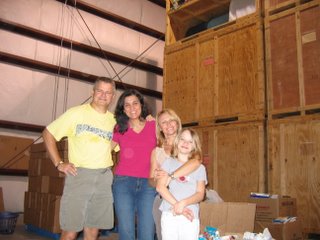 It seemed like yesterday we were collecting toys and rounding up food for operation "Blessing Christ", created by good friend and Christian brother Ramone, when the day was upon us. Last Saturday, we had the wonderful opportunity to bless hundreds of people in the city of Immokalee, Florida.
It seemed like yesterday we were collecting toys and rounding up food for operation "Blessing Christ", created by good friend and Christian brother Ramone, when the day was upon us. Last Saturday, we had the wonderful opportunity to bless hundreds of people in the city of Immokalee, Florida.The most needy area is right in our backyard - a town supported mainly by migrant workers who help the tomato industry thrive here in Southwest Florida.
We packed food and a few goodies into cardboard boxed and had a nice supply of toys as well.
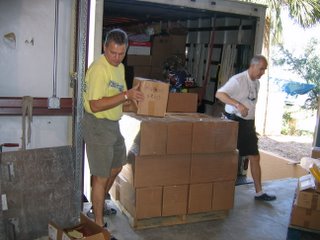 It was the first time for many of us to see the actual living conditions of most of the migrant workers. It was hard to believe we were in America. At some stops, we were overwhelmed with people. We had Spanish Bibles and books. There were toys for the little ones and each family was given a box of non-perishable food.
It was the first time for many of us to see the actual living conditions of most of the migrant workers. It was hard to believe we were in America. At some stops, we were overwhelmed with people. We had Spanish Bibles and books. There were toys for the little ones and each family was given a box of non-perishable food.What was troubling was to find some migrant workers were paying as much as $500 a week to live in a shell of a trailer and sent what little they had left over to their families.
Our hearts went out to them to know that we live in palaces in comparison. They stay, because the work is here. They can work hard and know they will have steady pay. For now, that is life. And our job this day was to spread a little hope.
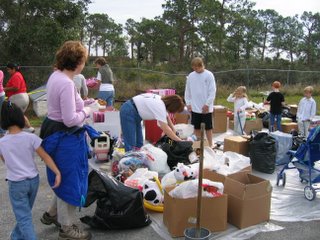 Around 3:30 PM, we ran out, and we had barely touched the surface. We turned away a few families as we loaded back into our cars and headed back to the church to see if there was anything left over.
Around 3:30 PM, we ran out, and we had barely touched the surface. We turned away a few families as we loaded back into our cars and headed back to the church to see if there was anything left over.The drive back down to Naples was quiet as we contemplated what we just experienced. This was real Christmas, played out in front of us. We did nothing but identify needy and give them what we had. What incredible joy we saw on each face. That is what living is all about.
We are so anxious to do this again. All of us jumped at the chance to serve. It is a life-changing experience. Giving is so fundamental to making permanent change.
 If I got nothing more than that experience, that would be awesome - my Christmas. But for many in Immokalee, that is just a little food for a few days and some small toys that will wear out. Fortunately, with the Bibles, they are able to find hope that transcends their condition.
If I got nothing more than that experience, that would be awesome - my Christmas. But for many in Immokalee, that is just a little food for a few days and some small toys that will wear out. Fortunately, with the Bibles, they are able to find hope that transcends their condition.I do look forward to doing this more often - next Christmas is too long to wait.
I encourage you to get involved in giving in some way. Make it a habit to give away the first ten percent of your income - even from your ads. Watch Higher Power bless. I challenge you.
Wednesday, December 21, 2005
Google Analytics - Accurate Data?
Very recently, within the last two weeks, I re-coded all my pages to include some JavaScript that allows you in a crude way, to create goals in your Google Analytics account of visitors clicking on the ads, be they Google AdSense, or Yahoo Publisher Network. Am sure the code would work with other forms of contextual ads displayed by JavaScript as well.
So, right off the bat, I'm not too certain how accurate the data is I'm looking at. For instance, Google Analytics tells me that my AdWords campaigns are performing lower than organic searches for conversions to Yahoo Publisher Network ad clicks. I find that fascinating! MSN searches are bringing more qualified leads than Google AdWords ads on the Google network.
But before you go and dump Google, there are a few things you must consider.
First, what sort of AdWords ad are you running? And what kind of page is the click taking the visitor to? I've seen contextual ads running that simply capture the search term you type in Google and try to make you believe you've got a good match. In fact, as the advertisement rises in position, because of the mechanics of Google AdWords, it actually can become less relevant - much like organic search results, where sometimes the top result is not the most relevant choice.
Take great care in choosing your keyword for your AdWords ads. Make sure they are words people would actually use when searching for your content. The bottom line is to convert a visitor, but that won't happen if they are taken to a page that is not what they are looking for.
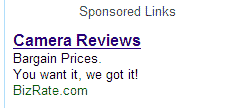 In this example, the search words I used were "camera reviews". BizRate.com is number one because they are paying more than anyone else, not because they are the best match. This is what happens when you try to go too broad.
In this example, the search words I used were "camera reviews". BizRate.com is number one because they are paying more than anyone else, not because they are the best match. This is what happens when you try to go too broad.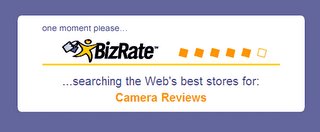 What's even funnier is the next page; a common "please stand by" page, similar to the ones we're used to at the hotel and airline shopping sites. This one gave me a laugh because it incorporated my search words as if they were tangible.
What's even funnier is the next page; a common "please stand by" page, similar to the ones we're used to at the hotel and airline shopping sites. This one gave me a laugh because it incorporated my search words as if they were tangible.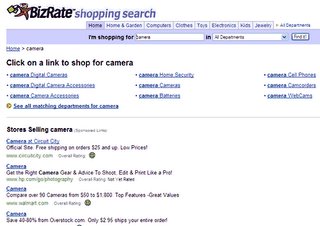 And finally, the results page. Would you click on any of the links with a word like "reviews" in your search? Neither did I. I click the "back" button and went back to Google. I'm not ready to "shop" if I'm using the word "reviews". I'm researching. Don't be caught in this trap. Think about what your visitor is thinking. They need a solution to their problem. Is your page a solution? If so, there should be a match, and possibly a conversion.
And finally, the results page. Would you click on any of the links with a word like "reviews" in your search? Neither did I. I click the "back" button and went back to Google. I'm not ready to "shop" if I'm using the word "reviews". I'm researching. Don't be caught in this trap. Think about what your visitor is thinking. They need a solution to their problem. Is your page a solution? If so, there should be a match, and possibly a conversion.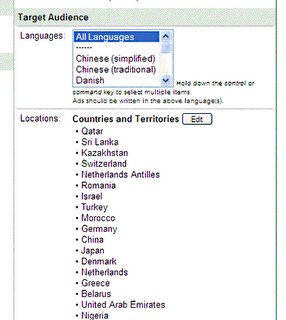 Other factors in the disconnect between the AdWords ad and the conversion at your page may be the countries your ad is showing in. Some countries are real clickers! Some countries click the AdWords ads like crazy, but never convert. These you want to eliminate. You can do this in the AdWords interface under Edit Campaign Settings.
Other factors in the disconnect between the AdWords ad and the conversion at your page may be the countries your ad is showing in. Some countries are real clickers! Some countries click the AdWords ads like crazy, but never convert. These you want to eliminate. You can do this in the AdWords interface under Edit Campaign Settings.How do you find who is clicking what? Using Google Analytics. The whole process is explained by Shawn Hogan. Once in place, you can get pretty good data on who is converting to an ad click.
I am not totally convinced that the data from Google Analytics is 100% accurate, or even 95%. Plus, there are some features I'd love to see that aren't there. For instance, where do the visitors come from that choose "wine glasses" as a search term? Are they from the USA? I have yet to find a analytical program that compiles that data - although it is readily available.
Here is a typical entry from an Apache web server log file:
As you can see, the visitor is from Canada, (.ca), and their search at Google.ca was "grenada". So, what is useful with this is that we can see where searches are coming from. It is possible people from Washington State don't care about Grenada, so if I get enough data, I could see that click from Washington State for Grenada don't convert. They were merely browsing. Not a whole lot of interest.belleville-ppp128528.sympatico.ca - - [21/Dec/2005:20:32:30 -0500] "GET
/grenada/index.html HTTP/1.1" 200 23437 "http://www.google.ca/search?hl=en&q=grenada&meta=" "Mozilla/4.0 (compatible; MSIE 6.0; Windows NT 5.1)"
I leave you with the very basics: Write content of value - solve their problem. Make sure your ads lead to those solutions.
And don't make me click the "Back" button. Take care.
Thursday, December 15, 2005
Writing Copy of Value to Your Visitor
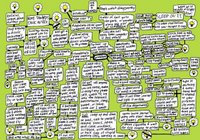 Of all the things I've discovered on making a living from my online work, knowing that my visitors will only stop if I have something they want, has to be the biggest money maker - by far. Yes, ad placement and colors have their place, but content of value is the most important asset you can have.
Of all the things I've discovered on making a living from my online work, knowing that my visitors will only stop if I have something they want, has to be the biggest money maker - by far. Yes, ad placement and colors have their place, but content of value is the most important asset you can have.Like you, I've Google'd and found many sites that offer content. Then, researching a little more, I've found many people already using the same text. Duplication of copy offers little to the visitor searching for new and valuable content. So, scratch that. And, if you're like me, you want to find a way to provide content without breaking the bank.
So, what do you do?
You write your own. Now, this takes some time, but I can simplify the homework by providing a step-by-step formula for writing your own copy. First, it is important that you know your audience.
That's sounds so easy, no? Know your audience. Okay - how? Much depends on your target audience - and what content you are aiming to provide. For instance, we know why many daytime television "soap operas" were named such because the primary audience is stay-at-home females between the ages of 25 and 36. These people were prime for agencies selling soap. Females are largely the ones who do the laundry or wash dishes. Advertisers knew their audience.
What's different here? Nothing.
Key in on who is visiting you - where they're finding you and how. Who are you writing for and who are you advertising for. Then ask yourself these questions:
- In the mind of the visitor, what is the problem facing them? Your whole site should be a resolution to that problem. You should strive to know their pain, problem and predicament.
- What is possible? This is what you expect the scenario will be to solve the visitor's problems.
- Why hasn't the solution been found? Maybe they're stuck - why?
- What is different now? Here, find what has changed in the visitor's life that would cause them to look to you for a solution.
- What should your visitor do? Tell the visitor what they need to do to come up with a solution.
Start by asking each question and writing down a few sentences on each. Often that's enough copy to create your page. However, you will find that it mainly provides a skeleton. The next step is to simply add more meat to the story. Add detail. Some copywriters create a page or pages for each step, with links to the next step. This provides a path through the site where the visitor will be presented with more pages, thus more ad impressions for you.
So, don't believe you can't do it yourself. You have the potential to write greatness. Don't rely on someone's work that may become extremely overused very quickly. Rise to the challenge; get out the notepad or keyboard and create your masterpiece.
Tuesday, December 13, 2005
Tweaking AdWords
Yesterday, I added a whole new site with pages about the best family resorts in the Caribbean. I released the site and created my AdWord campaign, as I teach, and today my expense to gain ratio is not in my "sweet spot". Should I panic? No.
My test cycle is 7 days. Of course, if things are going off-scale, pare them down immediately. But, always allow at least 7 days to review your numbers. At the same time, keep meticulous notes.
Basically, you are looking at a few major parameters to journal. You can print out most of these, but, you'll need to journal what you did; what changes you made. Here are a few I cover in the ebook:
- Capitalization of words in your AdWord ad
- Keywords and bid price
- Keywords added or removed
- Contextual ad placement/color/style
- New ads added/ads removed
But test you must.
What do you do when you find your campaign isn't working at all? If you have your documentation (journal), it will be easier to see where the break-down is. For instance, if you see you are spending more than a third of your income on AdWords, you need to check to see if the keywords you are using actually have to do with the context on your page.
My most famous mantra is create pages of value to the visitor. The whole object is to gain a relationship with the visitor - one of trust, that you have something of value to offer. The contextual ads are simply a bonus.
When you offer context of value, the monetization falls in place and people will read your content and go on to similar interests through the ads. So, many times when your campaign is failing - check the keywords, and make sure your content is what a visitor would be looking for if they entered that keyword.
And now, as promised, some keywords for you to work with. You can grab them here, and keep me updated with what you are doing and how it's going, either by commenting here, or writing me at naplesdave @gmail.com.
Thursday, December 08, 2005
Sprint (no) Service - Unacceptable
 One thing wealth brings is the ability to make choices. Many times growing up I was reminded that money doesn't grow on trees, and that this or that thing was "too expensive", or that "costs too much". In reality, folks around me simply had a case of "lack mentality". It wasn't until I stopped thinking in lack that abundance was a huge part of my life.
One thing wealth brings is the ability to make choices. Many times growing up I was reminded that money doesn't grow on trees, and that this or that thing was "too expensive", or that "costs too much". In reality, folks around me simply had a case of "lack mentality". It wasn't until I stopped thinking in lack that abundance was a huge part of my life.What does this have to do with contextual advertising? It doesn't. Skip this post if you'd like. Just something I have to get off my chest and maybe you need to hear.
When abundance takes over, money flows. If money doesn't flow, it stops. It's that simple. Think about if you are stopping money, or letting it flow through you - by giving and being a channel for money to flow through. When you accumulate it, it has a tendency to stop.
Lately the local phone company has been giving me fits. Now it takes a lot to do that because I'm a pretty calm person. The Saturday after Thanksgiving, our phone line went down. No dial tone. I called Sprint - which is our local phone company, and the only game in town. They gave me a date of December 5th - more than a week - and I laughed. They replied that service would be restored a lot sooner than that. It was because of Hurricane Wilma that they had their system gave those dates.
I called every day for an update. Some representatives of Sprint were kind. Some were short, and rude.
We got our service restored on December 6, a day after the projected repair.
 Today, the phone line is unusable. Noise, crackling, hum. Since I know the routine fairly well, I first created a ticket on the sprint.com/local website. Then I followed up with a call from my trusty Verizon cell phone. The projected repair date? December 13. About a week from now.
Today, the phone line is unusable. Noise, crackling, hum. Since I know the routine fairly well, I first created a ticket on the sprint.com/local website. Then I followed up with a call from my trusty Verizon cell phone. The projected repair date? December 13. About a week from now.What's wrong with this picture?
We had great service during and after the hurricane. Sprint claims that it is hurricane clean-up that is damaging their lines. That may be, however, Sprint management needs to dispatch help to the Naples, Florida area if crews are working one week behind schedule. Funny they should charge me a "Storm Cost Recovery Charge".
No matter how wealthy you may be, when there is only one company monopolizing a utility, you have no choices - and I believe that's unacceptable.
Thank God for cell phones.
Monday, December 05, 2005
Biased Honesty - A Look at Web Affiliates
 Many of you who know me, respect my opinion. I thank you for that. It is my quest to tell it like it I see it and hopefully help you out along the way. My belief is that if I help you get what you want, I will get what I want.
Many of you who know me, respect my opinion. I thank you for that. It is my quest to tell it like it I see it and hopefully help you out along the way. My belief is that if I help you get what you want, I will get what I want.My biggest gripe in the whole adventure in contextual ads has been that very few seem to know what they are talking about, and they talk about it in an incredulous way. Since the concept is a hot topic, I expected the arena to be saturated. And, that's okay. But what frustrates me more is that 98% of the so called "gurus" do nothing more than lure you into buying something to which they are an affiliate. Many times it is not even original work.
I must tread wisely here because I am about to launch my own e-book on how to work my contextual ad system.
The point is, you are expected to read through these sites with the hope that you will get enough information to form an educated decision on your potential purchase. What you get is hyperbole. Some go as far to admit it is "honest" hyperbole.
I am not knocking the affiliate system, just the way some affiliates go about presenting the information. Don't you feel the same way?
Here's what we're used to: Some large consumer reporting firm tests the product and gives us a score. We go to Costco and buy it. epinions.com is a favorite of mine. But that only works mainly for hard goods. Software without a large consumer base doesn't quite make the cut.
Is there any other way? One large testimonial seems to ask a little too much. Webmasters should gather many opinions and create a site similar to epinions.com. And then, let other webmasters write their own rating.
Sounds like a project.
Friday, December 02, 2005
Keywords for your Weekend
 My buddy, Peter, flies one of these. To me, it's intimidating, yet so beautiful. I am thrilled by almost anything that flies and this is no exception.
My buddy, Peter, flies one of these. To me, it's intimidating, yet so beautiful. I am thrilled by almost anything that flies and this is no exception.When we get together, as we will do this evening, we always talk about flying and the whole aviation industry. It is hard for me to put my mind around how Peter sits in the cockpit and leaves Miami for Osaka, Japan, without more than - "it's another day at work, Dave."
I think about that, and am certain, due to e-mails I receive, that many of you are intimidated by the whole contextual advertising industry. You are thrilled to see someone gain big, almost like cheering when someone wins on "Wheel of Fortune". I often told my Dad that it wasn't he that won the car at the end of the show. He was happy, just the same, to see someone else gifted in a big way. But that's another "blog".
You, too, don't have to just sit on the sidelines and watch. You do have enough knowledge to get started and create some great residual income.
I am currently working on an e-book that will detail step by step how to create and run your own site with contextual advertising. If you follow the steps in the book, you will be on your way to residual income within 30 days - I am confident.
If you'd like to be advised when the book is available, please drop me a line at dave@davejackson.com. I will send you an e-mail when it's completed. I am so sure you will benefit from this book. It will be complete in a few more days.
Now, it's Friday night - and I thought I'd leave you with a few keywords you can use to create some great sites. Just remember my rules: create sites with content of value and drive traffic to your sites. The rest will pretty much take care of itself.
Okay - the first keyword is "air mattress". 43,000 searches were done on it last month. There are 1,370,000 matches in Google for the keyword and around 110 AdWord ads for your AdSense pages, with the top bid running around $1.52. The KEI index is 1361.
Next is "chef hat". 12,000 searches last month. 401,000 matches in Google. 55 AdWords. $1.31 is the highest bid and the KEI index is 338.
Then there is "corel draw". 23,000 searches last month. 2,080,000 matches in Google. 33 AdWords ads. $1.82 highest bid. KEI index of 251.
Here's a great one for the season: "firewood rack". 5800 searches last month (better now, no?) 64,000 matches in Google and 55 AdWords ads. Top bidder was at $1.26. KEI of 518.
And finally, there is "fish oil". 38,200 searches last month. 2,090,000 matches in Google. 97 AdWord ads and $1.22 paid by the top ranker. KEI index of 696. Sweet.
These are from my research. I will post more soon. So go out now and spin the wheel. With enough clues, you will solve the contextual ad puzzle and win in a big way. That's my wish - and hope that you find many of your clues right here.
Thanks for your interest and have an awesome weekend.
Sincerely,
Dave
Wednesday, November 30, 2005
Google Page Rank and Contextual Ads
 Last April (2004), my family had the opportunity to visit the beautiful beaches of Ubatuba, Sao Paulo, Brazil, shown to the left. Overhead, a sky diving team makes light what would scare most of us senseless. Because they've jumped more than a few times, what was once frightening even to them, is now fun and thrilling!
Last April (2004), my family had the opportunity to visit the beautiful beaches of Ubatuba, Sao Paulo, Brazil, shown to the left. Overhead, a sky diving team makes light what would scare most of us senseless. Because they've jumped more than a few times, what was once frightening even to them, is now fun and thrilling!These guys didn't jump while we were there, and a friend directed me to their sky diving site, but I am told they all made it back down to earth only to jump again another day.
In my experience, you could go from a frightened contextual ad user to having fun watching your revenue increase in a few months. Block out a few hours of day now to learn your craft. Just remember - work this thing as a business, and you will get paid like a business.
A few posts back, I commented how the Google Jagger update zeroed out my Google Page Rank. It dropped from a healthy five. In case you are wondering, yes, I did write Google and let them know that I thought it was a mistake because the site does offer what many have told me is valuable content.
Of course, many think I'm just rehashing what they already know, but that's okay. If I had this information when I started with AdSense many moons ago, I would be wealthier.
In any event, I am happy to say that the powers that be at Google agreed with me and reinstated my Page Rank to a five. Someone actually took a stab at trying to figure out what Page Rank is and how it is derived. The funny part to me is that you never hear from Google whether someone "came close" or really "got it right". They are quiet about this stuff. But, if you read my post on Page Rank, you'll see it's an evolution of why Google even exists.
I was asked recently if PR really mattered in the grand scheme of things.
The question came in the form of e-mail, and had to do with the bearing Google Page Rank might have on the quality of contextual ads running on the site. So, I investigated.
Taking into consideration the Page Rank, I looked at click through rates and ad payout. What I found was that there is a correlation between the frequency ads are displayed and the quality of ads displayed, but no link between your PR and what ad appear.
As a matter of fact, the highest paying ads I have are running on pages with no Page Rank at all.
What does this mean? It means that I will continue to concentrate on what is most important and that is - driving qualified traffic to pages filled with content of value to them. Even if Page Rank did influence the ads, I would still make this my motto.
Okay, so maybe my few sites are not enough to qualify as a scientific experiment. But, I'm sticking with it until I learn otherwise. It just makes sense.
Keep working on getting higher CTR's and contact me if you believe I can help.
Kind regards,
Dave Jackson
Naples, FL
Monday, November 28, 2005
A Lesson in Necessity - Do You Have What it Takes?
You won't believe what I saw.
I am a people watcher, but this one takes the cake for stupidity. Along I-75 in Georgia, far from civilization, a fellow was watching at least a 5" DVD placed on the dash of his pick-up. He was engrossed in the movie, while driving at 80 mph!
Is it that some people just don't know any better? Or do they feel they are "much" more developed and can multitask at this level? I am sure you know what I feel. Accident waiting to happen.
And my favorite funny was the gal that rode my tailgate in the showoff lane for 5 miles only to get busted 10 miles down the road by a smoky. Pays to have a fuzz-buster. Showing my age, now.
Okay, on to today's lesson.
How creative can you get? Out of necessity on some streets here in Naples, FL, people got creative with what they had to get what they need.
The biggest question that perplexes me more than any other is why people wait so long to get into contextual or other monetizing of their web presence. Are you monetizing your web presence?
Probably not on the scale you could be. But it's your own fault, and here's why:
You don't have to.
Ever hear the story about the fellow who never repaid his buddy, but never missed a rent payment? That's the way most of us are wired. We will not get thrown out on the street, but know our buddy will probably keep letting us off the proverbial hook.
And that's where you come in. You don't have to make AdSense or any other advertising program work. It isn't a must. But before you hang your head and write me off, please think for a moment what would happen to your monetization program IF you had to make it happen? What if someone told you if you don't build your campaign to $1000 a month your car would be repossessed? You would be thrown out of your home or apartment?
Your Internet would be turned off forever.
Wow - got your attention now! And that's just it. When people ask me why it doesn't work for them, it boils down to the basics: a site with content of value and focused traffic. As long as those two are in place, people will be attracted long enough to your site to click an ad out of curiosity.
Prove me wrong - but per chance I'm right. You won't do what it takes to learn about a program, AdSense or otherwise, and work it until you are making the $1000 a month level. You won't read through the articles here, won't try and test what you've learned. What you will do is write and complain that it doesn't work for you.
Or will you? How much is it worth to you?
Here are a few quick tips to get you in the mindset to keep working on your AdSense:
- Create a goal. Right from the very beginning, create a goal of "X" amount of dollars you will earn by the end of next month. For beginners, I would set a daily goal of $5.00 at the end of your first 30 days. That should be a piece of cake with my materials here.
- Make your program part of a bigger plan. In other words, make the reason you are earning the ad money part of a bigger goal or vision. For beginners, I suggest giving 50% to your mother, the church, or someone else in need.
- Share your goals with 4 other people who think like you. Online communities are great places, or friends on your instant messenger list. Ask them to help you stay accountable.
- Lastly, ask God for help. Now that can't hurt, can it?
Okay, run with these. I really "do" believe you can do it if you make it a must. If it's not a must, you won't do it because you don't miss the money you don't have.
Monday, November 21, 2005
Blogging With a Mission
Sticky means you offer something people will be attracted to, will come back to. Viral is another word used, which means your idea permeates and grows because people benefit as it gets passed along.
You're reading this blog because you want to know how to make money with Google AdSense. You probably have a blog, but maybe you have a website that isn't a blog. So, let's assume that yes, we have content - but bottom line, we're doing this to make money. And there's nothing wrong with that. The only problem I have with some sites is that they teach you can make big bucks creating worthless sites around keywords - sites so bad that your only relief is to click on an ad to move on.
Here's the truth: If you have content of value, and drive traffic to your site, your site will become popular. With popularity your AdSense ads will undoubtedly receive clicks from people interested in finding out more information.
First thought - create a site with a mission. People love these kind of sites. My site fits in this genre. I talk about AdSense and blogging, and other contextual ads. Readers come back, or subscribe to read more news and tips. Stick to one theme.
One way to think of this is to consider the roadside vendor. I love buying fruit and vegetables from these places. Let's say there's a place down the highway that has apples as you pass by. One day you decide to drive the same highway and stop by to get some apples. As you pull up you strain to see where the apples are. Oh - today we're selling squash!
You get my point. I can't rely on the vendor and wind up going to the supermarket.
The second thought is someone who can really grab readers just by the way they write. Erma Bombeck was great at this. Dave Barry is fantastic. You seek out their columns just to read their take on whatever has come in their lives that week. Blogs are great for this kind of thing because each day you can post on a different topic and readers can relate.
It becomes confusing when you try to do both.
 I probably mention Hurricane Wilma at least once a week, but it's only because it left quite an impression on our town. This picture is just one of many signs around town that need to be fixed. Confusing, isn't it?
I probably mention Hurricane Wilma at least once a week, but it's only because it left quite an impression on our town. This picture is just one of many signs around town that need to be fixed. Confusing, isn't it?The best blogs are those where you know you're going to get some valuable information to take with you. Like the sign, they should tell you where TO go. They share a new tip, news about a company in the same industry, what the trends are. You find yourself going back time and again, or best, subscribing.
Take time to plan what you will blog about. Yes, it's okay to deviate and post something else of interest to you - just come back to earth and tell me more about your mission.
And if your mission says you sell apples, don't surprise me by changing to squash. I'll get my apples elsewhere.
Thursday, November 17, 2005
AdSense Dreams
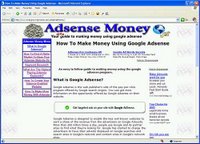 I ran across this site today. It's built like many, many others that tout you can make megabucks by following some steps.
I ran across this site today. It's built like many, many others that tout you can make megabucks by following some steps.Here are the steps outlined:
1. Find a niche market using Overture or Word Tracker and luck (in this case the webmaster uses the word "instinct").
2. Find keywords.
3. Find highest paying AdSense keywords.
4. Get the AdSense on your new pages.
5. Make more money with AdSense, i.e. duplicate your efforts above.
Why won't this business model work?
Let's take it step-by-step:
First, we find a niche market. Here, I agree. Find something you are passionate about and create a site around it. Yes, it really helps if your passion happens to also be a high-paying keyword. So, we find a small niche.
Secondly, we're asked to find keywords. These are words the people may use to find your niche site in addition to the niche name. This person suggests using keywords in your Meta tags. Of course, we all know Google no longer uses anything within the Keyword Meta tags. The suggestion is also made to make sure your context and titles are well saturated with your niche keywords. That can help.
Third point; find the highest paying AdSense keywords. These are not public knowledge. We can guess based on what some people say they pay for AdWords placement. But why do we even care? Shouldn't this be the first point?
Certainly high paying keywords are not small niches. And breaking down high paying keywords to smaller niches usually end up in lower paying keywords. But that's not the worst part.
Fourth point is to click his link to get you to sign up with an AdSense account. Google is paying $100.00 for each approved new AdSense account. I am quite sure the whole crux of the site is to convince you that if you have AdSense, you can easily create a nice residual income.
Point five is just make more niche websites and more money will come pouring in. However, the author left off one big point - how to drive traffic to your site. The fallacy is, "if I build it, they will come". But even if you do get listed by the search engines - with a halfway decent keyword, where will "you" end up? And why would anyone click your page when there are a few hundred pages in front of you?
All this to say the majority of these sites, and the ones advertised using AdWords (who appear as the AdSense on this blog) are bogus. They offer misinformation and are of little value.
AdSense can be quite profitable, but you just can't fling a site up and hope people come. But if you're a subscriber here and have read through past posts, you already know that. There is a formula which takes time and effort.
The payoff can be big. Just make sure it is big for both you... and your reader.
Wednesday, November 16, 2005
Google Analytics Overload
 On a trip to Rio de Janeiro a few years ago, I wanted so bad to Boogie Board the awesome waves of the Atlantic that broke right in front of the Sheraton, that I planned everything to work like clockwork.
On a trip to Rio de Janeiro a few years ago, I wanted so bad to Boogie Board the awesome waves of the Atlantic that broke right in front of the Sheraton, that I planned everything to work like clockwork.But, to make a long story short, I was in way over my head as far as my abilities, and I would crash off the top of these 15 foot monsters and be thrown 30 yards up the beach. The local kids would laugh as my board shorts almost left me as well. They were pros - down here every day - I was a Gringo, wanting desperately to catch a wave and look (and feel) cool.
But I wasn't ready. I had to do more homework.
Just like the dynamics of those waves, there are more things Google Analytics analyzes than you can shake a stick at. And the screenshots all look nice and snazzy, and at first glance, you can see how long someone stayed on your page - and how many people came from where - but what do I really need to know?
Grab me one of those caffeinated chews.
The help manual behind Google Analytics is huge. So here is my plan: spend the time I need to understand how this all can work in my best interest. (And report on it here so we can discuss it.)
For instance - what I really want to know is how to track my AdSense ads. Another good read would be - how to set up AdWords ads to track with Google Analytics. I clicked on "Link your AdWords account to Google Analytics", but now I learn that "linking" doesn't mean the ads get linked to the analysis. It just means that you can access the Google Analytics page from your AdWords screen as a tab running across the top.
Do I need to enter a special URL, like index.html?mustseeaua ? Or can I just leave them as they are?
Okay, where's my day planner? Dennis sent me a cool site to create todo lists. This challenge will require some quiet time and some serious thinking.
Tuesday, November 15, 2005
Best Web Stats Analyzer - Google Analytics
 If you have been searching for something to analyze your visitors and the ads being displayed, it has arrived, for FREE, from Google.
If you have been searching for something to analyze your visitors and the ads being displayed, it has arrived, for FREE, from Google.It's called Google Analytics and it is the former Urchin web statistical program with more features. It will track your visitors, keywords, URL, pictures, almost all data to and from your pages.
Yes, it is free, and some suggest that it really isn't free since Google now has all of your analytical data for your websites. But I look at this differently.
Whenever you have a win-win situation, you get very intense data - they find out what is working for you, things flourish. In fact, so many people are already signed up for Google Analytics that the initial data has not been returned to view as of this post. It's a good thing.
Yes, they now have access to your webstats, but in turn, they show you what is working for you and you get that for free.
Understand that Google is in business to make money, as well, and this information will help them develop bigger and better products for the marketplace.
Remember in the movie, A Beautiful Mind, John Nash and friends sat in a bar and in walked a beautiful girl. His friends said something to the effect - guys, remember Adam Smith - (father of modern economics), each man to himself! But it was at this point that Nash came up with his new theory, the Nash Equilibrium - where instead of competition, every man for himself - they would work together to solve a problem so everyone wins. Nash, in the movie, says to forget Smith - his theory is wrong. If we cooperate, we all win - referring to the girl's friends who had entered behind her in the bar.
All this to say that through cooperation bigger things are accomplished. You don't have to sign up for a Google Analytical account, but if you do, know that Google is your teammate.
Monday, November 14, 2005
How to Use AdWords to Increase Your AdSense
Am I saddened however, to learn that with the latest Jagger 3 update that I've totally lost my Page Rank. But that's okay. Page Rank is nice and as we've discussed here, isn't everything, but it is important. I'm resolved to make the loss into a project where we can build back to where it was, a 5, and maybe more - who knows!
Okay, back to AdWords and YPN.
Well, to make this work, you have to have both. If you don't have a YPN account, you can do this will AdSense, but the return won't be as much. My feeling is that this is because there is more volume of ads with AdSense, and YPN is in Beta - not as many to choose from, so the pricing is a tad higher.
When I first started using AdWords ads to direct people to my YPN sites I used a broad keyword match. This means I chose the word "widgets" as a keyword with no quotes. So if you searched for Widgets in America or Pictures of Widgets, my ad would appear. Why is that a bad thing?
Initially, you may think, that's not so bad. We get everyone looking for widget-anything. But here's the whole key to using your AdWords account: You must use keywords that will bring to your site people who will take action with your content - not just people browsing to see what you're doing.
Please get this point because you'll save thousands of dollars over the long term on click that did not convert to anything.
I'm advertising with AdWords, and the YPN ads being displayed on that site are asking you to check out widgets at such and such store, better widgets, etc. Now the first search above - "Widgets in America" - who might type that in? Somebody interested in the widgets there, no?
And the site tells them about the very best widgets in America and what quality they may find there. "If" they are looking for widgets - and this is the secret of using AdWords - "if" they are looking for widgets, then they are most likely a candidate for the ads running on that page. But why is that? Do you see the magic, yet?
If they are checking widgets, they are most likely wanting to learn more about that industry. And if they are interested in that industry, you can bet they are thinking of related products and services. When they arrive at the page and see pictures of the widgets, and read about how they are so spectacular, they will also see the Yahoo! ads that ask that they check out orange widgets or low cost widget boxes. Certainly they will at least be curious.
Now stay with me on this, because you can think that - okay, we got them to the page and our job here is done. That was just with the person who searched for "Widgets in America". What about the person who searches for "Pictures of Widgets"? My AdWords ad will match that because remember I am using a "broad" match - which means when they type in the word "widgets", my ad shows up on that page.
But what of this person searching for "Pictures of Widgets"? Why are they searching? Do you suppose they are wanting to buy some? Do they need cheap boxes for them or great, new designs of them? Odds are they are looking for some beautiful pictures and that's about it.
So what are the chances they will click on the YPN ads displaying orange widgets and cheap boxes? Almost zero - there is no interest in that for them.
Unfortunately for me, I paid the same amount of money for them to go to my page as I did the more qualified person who will probably want to know how "low" is low cost boxes - will click on the YPN ads and I will make some money.
See what is happening? You want to ask for the people who will most likely click on an ad on your site. So target those keywords. Don't use a broad match. For the widget site, I use (and this is just like a search engine, you add the quotes), "widgets in america", "american widgets", "orange american widgets" (another good chance they are thinking about the latest colors), "low cost american widgets", etc. You get the idea.
I don't want people who are looking for pictures, looking for widget news, widget history, etc. And that leads us to the next point - important as well - can you make money doing this AdWords/AdSense or AdWords/YPN thing?
The answer is yes! The reason is in keyword targeting. The keyword - widgets - in a broad match is more expensive than most targeted matches. But not always. Sometimes you will find that "florida widgets" is more expensive than just - widgets. (Exchange your keywords for mine.) This especially happens when the keyword is a high paying one, take for example "green widgets".
But, listen - when you target, you may pay a little more per keyword - but it is still "much" cheaper than a broad keyword match, where everybody and their brother will be searching for items not even in the same ballpark as your AdSense or YPN ads. If you find that you are spending too much for your AdWords, then set the daily limit back.
Another great tip I can pass along to you is to try to keep your ads appearing in the top 4 positions on the Google Search page. I see the best return on my keyword when I'm at the 4 - 6 position. Anything greater than a 6 and your ad will appear down the page (I'm talking about the text ads that appear when you do a search with Google, along the right hand column), too far to be seen - in other words, off the page unless you scroll down. People don't normally scroll down.
So keep your AdWords position around 4 or 5. If you go any higher, you're probably spending too much for that keyword to make a profit on your AdSense or YPN ads - when people go to your site and click them. This is key, so learn this and make sure you don't pass higher than a 4, unless your AdWords ad is the only one showing up.
And finally, if the keywords you selected in AdWords don't get at least a 0.5% click through rate (CTR), after 1000 impressions of your ad on the search pages, Google will most likely disqualify it and you'll need to increase your bid. Watch your keywords at least four times a day and increase as necessary until you are in the 4 or 5 position.
Let me know how you do. This is a great way to make great money with AdWords (advertising) and Google AdSense or Yahoo! Publisher Network. I will try to answer any questions you might have.
Wednesday, November 09, 2005
Do Link Exchanges Work?
The latest move by Google, called Jagger, is causing quite a stir in the SEO community. Sites, which formally had top positions in Google, because of reciprocal linking have suffered huge position losses.
Here's what I found.
There was a sharp drop in search engine ranking around the first part of July. I estimate the loss to be around 40%, mostly due to fewer links being attributed in the Google search engine. These same sites also showed a loss in duplicate links. Google now reported only one link per domain.
With the implementation of Jagger many complained their links were not counted and their pager and plummeted. One thing that may account for losing links is the fact that with Jagger some sites dropped out of the search engine. Google no longer considered these relevant.
On the other hand, it just could be that Google no longer considers links at all. This makes the most sense to me, because reciprocal links are really a method of falsifying popularity. It's the lazy man's way, or should I say, "was" the lazy man's way to great page rank.
If your site has lost page ranked or popularity with the latest move at Google, I suggest first checking out your links. During the latest shuffle, some links to some pages, have actually returned. Webmasters are telling me that these are on pages that have highly valuable content.
Links that probably won't disappear are those that actually link for a purpose other than page ranking. Those linked for the reason of pointing someone to your great content, those with strong relevance, generally stayed.
So what should you do?
Reconsider your linking. Concentrate on strong inbound links that link to you, because of your strong valuable content. This may not be the fastest strategy to get higher search engine positions or higher page rank, but it's good business practice and is a solid way to put your site on top in the long run.
Google still says on their website:
We understand that these changes can be confusing. If your site's well linked to others on the web, it's likely that we'll add it again during our next crawl. While we can't guarantee that any page will consistently appear in our index or appear with a particular rank, our Webmaster Guidelines, available at http://www.google.com/webmasters/guidelines.html, offer helpful tips for maintaining a crawler-friendly site. Following these recommendations should increase the likelihood that your site will show up consistently in our search results.
Should you try to outguess the search engines? No! They change their algorithms more often than you think. You'll never win.
Here's what you should focus on:
Build rock solid links, and keep your content valuable.
Focus on beating your competition by educating your audience.
So it gets back to the basics - keeping content relevant, of value. It's what I've been preaching all along.
Fancy ways to gain popularity come and go, but what will keep you on top are basic principles, and one thing I've learned is that principles...never change.
Dave Jackson
Naples, FL
Monday, November 07, 2005
The Key to a Great Website
 I've always written that yes, Content is King, but I've added that the content MUST be content of value. Well, just what does that mean, "content of value". It is just what it says.
I've always written that yes, Content is King, but I've added that the content MUST be content of value. Well, just what does that mean, "content of value". It is just what it says.I used to say it doesn't take a rocket scientist to tell between a great website and a website of little value. But the more I am asked to consult sites for AdSense use, the more I am convinced that many people don't "get it".
We recently had a major hurricane roll through Naples. Now we're pretty used to keeping one eye on The Weather Channel here, so when Wilma took a turn for us, we took it seriously. Most boarded up their homes, the rest left town. One thing we could do little about was the trees.
I grinned as I watched my neighbor hire a crew to trim his beautiful trees back to stubs. I thought, Marc, you're over reacting. But guess who did the right thing? Marc's trees didn't fall when Wilma struck. Why not?
Two things I want you to learn here.
1. Many sites have very little value, very little in substance (roots) to keep them solidly placed in a storm of information.
2. Probably the best way to get back to basics is by trimming your site back to a stub. Get rid of fluff - anything that keeps your site from being linear to your visitor.
My trees fell in the storm. Their root system was shallow and Florida is made of sand. I would have been served best to trim them, get them down to a few specific branches with little resistance to the winds of a hurricane.
Make sure your website contains structure. Build on a theme and do not add anything that would deviate from the theme or main idea of the site. Visitors will not tolerate fluff. They want to walk away with "value". Give them value and they'll come back. Become useful.
Tell a friend about these tips, but only after you've taken a look at your sites and done some serious trimming.
Thanks for your time,
Dave Jackson
Saturday, November 05, 2005
How Do I Know AdSense Works?
Google updated the "case studies" page recently.
The entries are "Ask the Builder", an AdSense publisher that was recently featured on an AdSense webinar. Then there is CamcorderInfo.com. This is a site that has done well with a comparison type website. And finally, there is Weblogs, Inc. Now these guys were recently featured on the Inside AdSense blog and here we see what they've done with AdSense.
You can now visit two distinct sections in "case studies", beginner and advanced.
This is great because you will be able to see how websites are being created around AdSense and the thinking behind it, not just how they experimented with hotspots on their pages. An example is the EngineeringTalk case study, again, featured in the AdSense blog.
Questions - Do you think these studies really help? Have you used any tips? If so, please share with us.
Thursday, November 03, 2005
Yahoo Ads - Yahoo! Publishers Network
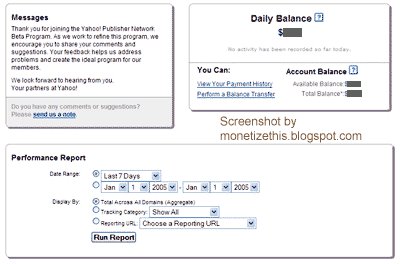 You may know that one of my sites has been doing extremely well since day one. I am adding a new pages every few days and it seems to be viral in that people look at one site and click to another to read about different topics.
You may know that one of my sites has been doing extremely well since day one. I am adding a new pages every few days and it seems to be viral in that people look at one site and click to another to read about different topics.So I decided to place the Yahoo! ads on the main site. This is one of the newest pages and doesn't have a lot of traffic.
The temptation is to place it on one of the sites that is doing well to see if YPN as it's called, can pull the weight.
With YPN you can target from various sectors. In other words, my pages are on travel, but if I like, I can show ads on mortgages. I am sure it's only a matter of time that Overture will have a passel of ads and they will better match the context. For now, remember we're in Beta and it is interesting to watch each day how the ads better reflect the context of the page.
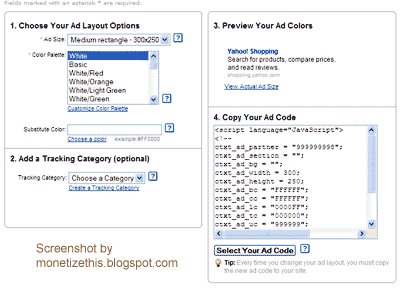 For instance, on one post, Google AdSense is on the page, we get ads with just about everything you'd want and expect. YPN, set for a particular target, shows you some relation to that target - but maybe not you'd expect. Believe me, that will greatly improve over time.
For instance, on one post, Google AdSense is on the page, we get ads with just about everything you'd want and expect. YPN, set for a particular target, shows you some relation to that target - but maybe not you'd expect. Believe me, that will greatly improve over time.I loved the font of the YPN ads. Looks nice and crisp, flows with the page. It is slightly bigger than Google's.
There are some programs and scripts that allow you to rotate AdSense and YPN ads. I will cover them in another post. And, no, I'm not leaving the AdSense program nor will I stop writing about optimizing your work to get the most out of it. Let's continue our discussion. My point with talking about YPN is simply to show you that if you had any doubt, contextual based ad serving is here for a while.
Tuesday, November 01, 2005
Using the 336 by 280 Block and Sectional Targeting
Still, it's a new month and I'm going to see how well moving the blocks will improve things. You may notice, I've removed the AdSense links along the top as well as the block on the page footer. There are now two skyscrapers running down the side which will accompany the blog column.
In addition, I've added Sectional Targeting to the template. It really doesn't matter on this blog, since everything here is about one subject - but be aware this is a great tool, especially if you cover more than one subject on your page and your AdSense ads are typically following something off topic.
Google Responds
I had a problem with one of my sites, where the AdSense ads did not have anything to do with the text. The appeared to be legitimate ads, not Public Service Announcements, so I wanted Google to have a look.
They request in one place on their site to wait for 4 hours. On another place, the request is 48 hours. I waited about 30 hours before using their online troubleshooting wizard and shot them off a letter.
 Their reply was polite and to the point.
Their reply was polite and to the point.So, don't be intimidated by Google and the AdSense team. They are there to help you. It is of benefit to them to get your ads correct as well.
Because I wasn't as clear as I should have been, AdSense only fixed the ads on index.html. The same problem exists on another page, /2005/10/pocahontas.html, and I noticed that the ads that appear when I drop the www on the domain have nothing to do with my site. But that is typical. Until enough people access the site without the www, Google doesn't know what to serve as the bot has not visited that iteration of the site.
What's next?
I will write Google back and have them take a look at the above link. I am confident that they will clear it up before the week ends.
Monday, October 31, 2005
Google AdSense Happy Halloween



Some AdSense participants got a "treat" this Halloween.
Their AdSense blocks were cutely decorated in the Halloween theme. I did not see any of my ads so embellished, but who knows what might happen with Christmas around the corner?
The only repercussions I can think of are the ads being displayed in parts of the world that don't celebrate the event. Maybe they'll be asking Google to include some of their holidays.
Let's see... Brazil alone celebrates over 60 holidays a year...
A reader of my blog sent these in. Enjoy and comment.
Sunday, October 30, 2005
My AdSense Ads Don't Follow my Context
You see, on one of my niche sites I found that the ads were not following the context a full three days into the project. The AdSense template is in place, but I'm getting ads for hurricane type products.
So remember, we use the wizard that says, "The ads don't appear to match the context of my site." Clicking that I get an order to clear my browser cache and cookies. That done, I press "Continue". Here I'm asked whether the code ran for at least 48 hours. This is a time window Google is allowing for the famous GoogleBot to crawl the site and match ads to context.
When I click "Yes", that 48 hours has passed to allow the GoogleBot to visit, the next pages asks if I am using an language that is accepted in Google's AdSense program.
On the next page, I'm actually stuck - because the questions are: "Yes" - My settings are for both image and text ads, or "No" - My settings are for image ads only.
And here's my dilemma; according to current AdSense thought, text ads perform better than image ads. Image ads are said to remind us of the good ol' banner ads we have become blind to. I'm following current thinking and using "text only" ads. What are you using?
I clicked "Yes", that I'm using text and images, because at least the word "text" appears.
The next screen asks if you are using Flash. The idea here is if the page is almost all Flash content, the Google software will not have enough text to make heads or tails of the context.
I'm then asked if I've made recent changes. Well, since this is a new page, I select yes.
And that brings us to the end of the wizard, which says, wait another week and a half for a new spidering of the site.
 Are you that patient? (plus 1 and 1/2 weeks of AdSense revenue on the page/site could mean quite a loss). I wasn't, and so drilled down to the page where I am able to fill out a form.
Are you that patient? (plus 1 and 1/2 weeks of AdSense revenue on the page/site could mean quite a loss). I wasn't, and so drilled down to the page where I am able to fill out a form.So, I wrote that the ads don't seem to follow the context. My experience with Google is that they are quick to respond to a request. I'll post a follow-up when they reply.
Another way to check your page is to drop the www in the URL. For example, you will find that http://www.myfavoriteproductsnow.com/ and http://myfavoriteproductsnow.com/ returns two different results.
One thing Google may suggest to you is Section Targeting. I'll cover that in another post. There is a way to fine tune AdSense to use the context on the page you choose. Pretty cool.
Saturday, October 29, 2005
What is AdSense Smart Pricing
You and I both know that some of the most fascinating and creative code comes from behind closed doors of Google, Inc. Smart Pricing is no different. Automatically adjusting the cost of a keyword-targeted content click, you gain less when data shows that a click from a content page is less likely to convert to a sale.
Recently, while trying to convince a former AdWords account to return from Yahoo's Publisher Network, it was reported that a Google team member gave insight to how the program may really work.
- Smart Pricing affect your entire AdSense account, not just one page.
- This means one poorly converting site can impact your whole account.
- Smart Pricing is re-evaluated each week. You can improve your numbers in as little as a week by removing low converting AdSense blocks.
- Smart Pricing is tracked with a 30 day cookie.
- Smart Pricing affects both text and image ads.
- Publishers earn less because the advertiser pays less than their minimum bid.
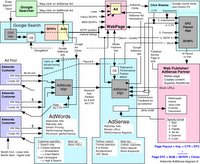 And really, how can you tell which are low converters? Quite possibly the lower converters are simply lower earning niches. If you dropped them, you could really foul things up.
And really, how can you tell which are low converters? Quite possibly the lower converters are simply lower earning niches. If you dropped them, you could really foul things up.Here's what I thought when I learned this: what about swapping Yahoo Publisher Network ads for my AdSense ads on the lower converting sites?
Well, even before I had the chance to plug in code, Google sent out this information in an attempt to clarify the stories floating around about "Smart Pricing". Read on.
The facts about smart pricing
We've noticed a lot of talk recently about the phenomenon commonly referred to as 'smart pricing'. There are some misconceptions out there about this, so we wanted to provide a few facts about smart pricing and how to ensure you're maximizing your revenue.1. Many factors determine the price of an ad
More than conversion rate goes into determining the price of an ad: the advertiser's bid, the quality of the ad, the other ads competing for the space, the start or end of an ad campaign, and other advertiser fluctuations.
2. Clickthrough rate doesn't affect advertiser return on investment (ROI)
The percentage of clicks that convert for an advertiser is the most important factor in an advertiser's ROI, so it's not only possible, but common, to have a low CTR and a high advertiser conversion rate. It's also possible to have a high CTR and a low conversion rate. Don't remove the AdSense code from your site just because it has a lower CTR - it may be one of your best converting sites.
3. Google doesn't make money from 'smart pricing'
In fact, we make less money, since the cost to advertisers is reduced in order to provide a strong ROI. Ultimately, this leads to higher payouts for publishers by drawing a larger pool of advertisers and rewarding publishers who create high quality sites.
4. Remember the old chestnut: "Content is King"
The best way to ensure you benefit from AdSense is to create compelling content for interested users. This also means driving targeted traffic to your site -- advertisers don't gain as much ROI when paying for generic clicks as they do for quality clicks that come from interest in your content. Good content usually equals a good experience for user plus advertiser, which can be much more valuable than CTR.
Keep in mind that like most Google technology, our system for calculating advertiser pricing gets updated regularly. We're constantly improving our ad products to benefit both the publisher and advertiser communities; what benefits one side ultimately benefits the other.
Posted by Suzie - AdSense Publisher Support 10/28/2005 12:32:00 PM
Well, even still, it is tempting to experiment. What are you going to do with this information?
Wednesday, October 26, 2005
How to Make More Money with AdSense
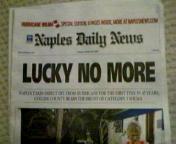 It's been quite a week for us here in Southwest Florida. Category 3 Hurricane Wilma struck on October 23rd, 2005, at around 6 AM. The Naples Daily News headlines read, "Lucky No More". But as we all knew, nothing could have been further from the truth.
It's been quite a week for us here in Southwest Florida. Category 3 Hurricane Wilma struck on October 23rd, 2005, at around 6 AM. The Naples Daily News headlines read, "Lucky No More". But as we all knew, nothing could have been further from the truth.Not only were we "lucky", (a term I don't believe in), we obviously had God's favor.
Sure, some people lost a lot. But the majority did not suffer much structural loss. The power was out for a few days, and pockets didn't receive power until later in the week. Comparatively speaking, we were "blessed".
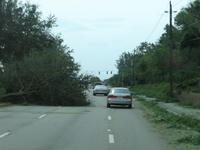 As the clean up continues after a major event like this, you find yourself diverting from your norm. Today you need milk, so you jump in the car and head off to the supermarket. Quickly, you remember there are three trees still down on the road you routinely travel.
As the clean up continues after a major event like this, you find yourself diverting from your norm. Today you need milk, so you jump in the car and head off to the supermarket. Quickly, you remember there are three trees still down on the road you routinely travel.With a grumble, you turn the car around and head back two blocks to catch Airport Road to take you on a slight detour to the supermarket. What is no doubt a few miles longer turns out to be... wait!! You realize you actually made it 5 minutes quicker going this way!
Can that be? You check your watch again, but sure enough, the new found route - even though it is longer in miles - is faster than the way you've been going for years. But what made us change?
Well, in this case, it took a major hurricane.
If you've been in the Google AdSense program for any length of time, chances are you have been displaying them the same way practically since the beginning. You glance every few days at your AdSense totals and smile. A few people are actually clicking on the ads and you're making money from a source you had not made money from before. Life is good.
Then, through some enlightened way, you land on this page, read the story about the hurricane and decide that a change must be made (at least some experimenting at different ways to display your ads).
For me, it took a road blocked by downed trees. For you, let this post shake you into AdSense experimentation.
Try the large block in the top left corner of your site, above the "fold". Let it run for a week. Track your findings. Keep a journal of what you find.
Most of you will move the ads around, see the results change - possibly down - and yank them before giving them a fair shake. In addition, I've found that 95% of my readers never bother to track their findings. Fewer still keep a journal.
Make a commitment to experiment. One change could double your earnings. Keep content fresh and current. And let me know how you're doing.
I found a quicker way to the supermarket. I also make a nice living with AdSense.
Join me.
Saturday, October 22, 2005
How to Increase Page Rank
 I'm sitting in my formal living room, feet up on the carousel table that graces the space between the leather couch and the Yamaha Disklavier grand piano. The bottom of the Compaq notebook (c 1999) is hotter than an iron. My Google Desktop is rotating photos of a recent trip to Chicago. The AdSense plugin impresses me with the clicks, CTR and best of all, Earnings for the hour.
I'm sitting in my formal living room, feet up on the carousel table that graces the space between the leather couch and the Yamaha Disklavier grand piano. The bottom of the Compaq notebook (c 1999) is hotter than an iron. My Google Desktop is rotating photos of a recent trip to Chicago. The AdSense plugin impresses me with the clicks, CTR and best of all, Earnings for the hour.Recently, my daughter surprised me with a "birthday party" in this same room, complete with party hats and cake, and even took the picture. She's only five, and the camera is pretty sophisticated.
It is impressive when you think how far the technology has come to make all this possible.
Google itself has evolved. A news search shows 26,900 entries for "google". They seem to be into everything, with no technology safe. At the same time, everyone wants to be on their bandwagon. Get in good with Google and maybe some of the profit will rub off on you, no?
 One of the most coveted pieces of Google is their Page Rank. Now, if you search for "How to Increase Page Rank", you'll get 275 entries. When you search just "page rank", you get an unbelievable two million, 930 thousand. So, obviously it's pretty important. There are ebooks, online courses, programs and teleconferences - more training than you can shake a stick at. So who do you believe and which do you choose?
One of the most coveted pieces of Google is their Page Rank. Now, if you search for "How to Increase Page Rank", you'll get 275 entries. When you search just "page rank", you get an unbelievable two million, 930 thousand. So, obviously it's pretty important. There are ebooks, online courses, programs and teleconferences - more training than you can shake a stick at. So who do you believe and which do you choose?Interestingly enough, Page Rank was the impetus for the Google Search Engine. Co-founder Larry Page was frustrated that then top search engine AltaVista displayed results, but in no given "rank" or order of importance. The driving factor of getting listed higher was tied to how many of the search keywords you had in your web page (and meta tags).
Larry created "BackRub", software for spidering how many "back" links a site had. Depending on the importance of the web linking to the site, Larry's software ranked that page higher in relevance. BackRub gave way to a new name, Page Rank, named after its creator, Larry Page.

I started this blog on September 11, 2005. On October 21, 2005 the blog had a page rank of 5. How did that happen? In spite of what you read, there are only a few things that will increase your page rank. The first one is something I have preached since the beginning of this blog - and that is, "content". If you've followed the posts, or read the archives, you know I've experimented with some software that posts the headlines related to a topic you can choose. I don't consider this scraping because on none of the sites do I steal or scrape an article and post it as it were my own.
None of these sites rank as well as content that is written from research or from a passion. What other than content? Content of "value". And that is what will drive visitors to your site. When they see something of value, they will stop and read - and most importantly, if they have a website - "link" to you. And just like a newspaper - an ad or two may catch their eye and they will follow it to see what it's about. (Think of how much more powerful contextual ads are when they deal with the same topic as your web page?!)
Content. Content with value. What else?
I also outline early on how important it was to get people to subscribe to your blog, even if it's your friends and family. Every link helps. And even more important is telling the blog search engines like Technorati and Syndica8, where you are. Make it easy for people to find you.
Then, of course, there are "links". When you read how page ranking works, you'll see that most of it has to do with who links to you. The idea is someone would only link to your site if they considered you important.
Let's break it down.
- Content is king. Write about stuff that is interesting. Make sure it is fresh.
- Write something of value. No one will hang around for fluff.
- Get listed. Find the blog search engines and add your blog.
- Get linked. If you have a site with a page rank, link to it. If you don't, try buying some links on eBay. Try to stay within your category - again, make it of value for someone to bother clicking on your link.
Patience helps. Be patient. Google re-ranks every 80 - 90 days. It may take that long to get "ranked" if you started shortly after they ran their last update.
Ask questions. I will help with what I know, or direct you to some great resources. Experiment. Get in for the long term.
Now, there you go! Once you get it down to a system, you'll have time to have tea and birthday parties on the carpet - and not stress about your contextual ads.
Problems with My AdSense Ads
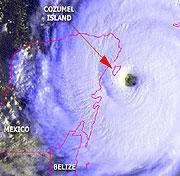 Hurricane Wilma can't make up its mind. A monster storm has many parameters of influence. Those we often hear about; ocean temperature, terrain and weather fronts, make up only a fraction of what drives a tropical cyclone.
Hurricane Wilma can't make up its mind. A monster storm has many parameters of influence. Those we often hear about; ocean temperature, terrain and weather fronts, make up only a fraction of what drives a tropical cyclone.Hundreds of other details, jet stream, sun storms, eye wall height, to name a few, also play a big part in where the storm will go and at what strength.
fortunately for webmasters like you, your challenges with making AdSense work is simpler. The thing that drives AdSense is the context of your web page that the Google engine can decipher, nothing else.
That said, I get many questions like, "if that's the case, why can't I see AdSense ads on my page"? Another biggie is, "the ads Google serves have little to do with my context. What's up?" We've all seen the Public Service ads, especially on pages Google has little inventory for.
So, what's the answer?
Until recently you had to "Google" your way across cyberspace to find your answer. But now, Google itself has created "Troubleshooting Wizards" to help you find the solution. Yes, Google is into just about everything, but no, these aren't physical wizards with cone shaped hats. Hopefully they'll never get into that.
Predicting the landfall of a hurricane is much like the stock market. Past performance doesn't guarantee future results. However, these tips will better steer your AdSense campaigns to a bigger bottom line.
Here they are:
I placed the AsSense code in my HTML, but no ads appear.
All my ads are Public Service ads. How can I change them?
The ads don't appear to match the context of my site.
I don't want my competitors showing up in my AdSense.
Until next time,
Keep fine tuning!
Tuesday, October 11, 2005
How to Get Them to Click Your AdSense Ad
Interestingly enough, the guys making big bucks in AdSense don't stoop to those tactics. They don't need to.
So if you are looking here for a way to create a gimmick on a page to make people click an ad they would not normally, you won't find it. That's against the Google AdSense Terms of Service.
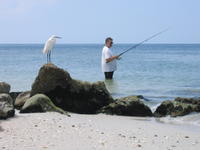 But there must be ways to better your Click Through Rate, no?
But there must be ways to better your Click Through Rate, no?Let's look at a few things that have been proven to "improve" your chances.
I am blessed to live in Naples, Florida. A few days ago I walked to the beach (a few minutes from my front door), and took the picture of the fisherman.
Although it's beautiful, the fisherman is frustrated. Several factors were working against him on this day without a bite. The biggest thing was the effect "Red tide" has had on our fish. To date, over 450 tons of dead fish (subscription) have been taken to the local landfill.
So right off the bat, the "content" he is fishing in isn't good. In other words, yes, fish are out there, but they are being choked by the algae bloom. Nothing would interest them right now.
Next, I wandered over and asked what bait was he using. He said shrimp. Now shrimp can be good, and I'm not expert on Gulf fishing, but he wasn't getting any bites at all. Might be time to spruce up the bait a little.
 We'll call proper bait the "ad size and placement" in our analogy.
We'll call proper bait the "ad size and placement" in our analogy.I've seen many fishermen at our pier fish for hours with shrimp and not catch a thing. My thinking is the fish just want something else. They are probably blinded by shrimp bait because everyone uses it.
But the biggest factor with our fisherman is that the overall content was absolutely deadly. The fish didn't want to be there and indeed, many were dying to get out.
So how can we get them to bite at your ads?
Enough for now. Work on making your ads blend with your pages. Concentrate on delivering great content. That's what draws people to your site. And your AdSense Ads will reflect the content as well. Isn't that what you want?First - Don't force the ads to look like ads. I have seen countless, and am sure you have, too; countless pages with Google AdSense ads that are the Google default. Remember that Google provides you with tools to make your AdSense look awesome. The best tip: blend the ads in with your page. Make them appear as an integral part of your site.
Second - Use text ads and not image ads. Text blends better. Fish are blind to the same ol' bait. We are blind to banner ads. Don't go there - your visitors certainly won't.
Third - and lastly for today, create awesome content. Don't give your visitors the "red tide". Keep searching for content and make it of value. Some great sites offering free content are: ArticleCity.com, ValuableContent.com, and EzineArticles.com.
Sunday, October 09, 2005
Cashing in on an AdSense Tip
Read that again. It's true.
Here's the problem. Most of my readers don't want to take the time to do the research necessary to grow their earning. For those who do, the equation will work: Adsense Revenue = Traffic Levels + High Paying Ads + Relevant Ads + Optimally Positioned and Designed Ads.
Here's my recommendation for today.
Take one area you know you need to improve on and spend a few hours really working on that. By really working I mean putting your nose to the grindstone without distractions and getting some real progress made.
Treat this as a hobby, and you'll have another hobby and make a few bucks. Treat this as a business - another good stream of income, and it will reward you for years to come.
Now before I go, I want to tell you that I am working on a new project. I just finished a site that offers opinion on a popular news topic. When creating some AdWords campaigns for the site, I noticed that one keyword that got me more clicks. This went on for more than a few days.
Next, I registered a domain name containing that keyword. Now don't go crazy and register domain names just for the sake of having keywords in them. That isn't good SEO, and doesn't always help.
But I mention this because it's another way you can find a nice niche.
Now, back to your homework. Let's work together.
Thursday, October 06, 2005
What AdSense Formats Work Best?
 Our daughter's grade school is right across the street, so it's easy to hop on the bike and with her on the seat tube we have a nice ride to the playground.
Our daughter's grade school is right across the street, so it's easy to hop on the bike and with her on the seat tube we have a nice ride to the playground.When we get close to the school, signs abound telling everyone to slow to 20 mph from 7:30 AM - 8:30 AM. There is the typical school zone sign, and the white lettering on the pavement.
In fact, at the corner there is even a senior citizen crossing guard!
Ever notice how everything ties together? Each weekday morning millions of kids go to school with hardly an incident? How can that be?
Optimization. Based on years of what works and what doesn't, local governments know what signs to place where, what color, size, style of lettering, color of lettering, reflectivity, height, distance from the school, distance to the school, and many other factors that have made school zones safe.
Likewise, there is a pool of experience that can greatly improve the monetization of your pages with Google AdSense ads. If you were starting a new school zone in your city, and you were appointed to create the "safest zone", would you start experimenting around? Wouldn't it make sense to do as much research as possible into what has been successful?
That's exactly what I've done with AdSense.
Lately I've been writing about different tips on how to get more visitors to your site because that is a vital part of the monetizing equation with Google AdSense. It only makes sense that in order to realize any revenue at all with a campaign, you must have someone visiting your pages and viewing the "ads".
But once those visitors start showing up at your site, either through promotion on your own, or by using Google's AdWords to point them here, cashing in on the experience of AdSense pioneers will insure that you're converting those visitors into clicks on AdSense ads displayed on your site.
Now, please review my other posts on this topic if you haven't already.
Back? Great! Let's get on with it.
When I first learned about AdSense, I thought I was dreaming. Here was a company (Google), willing to pay me for the traffic I was already enjoying to my sites. As I related in an earlier post, my friend, Matt Wright, explained to me that he was making well into four figures a month on his sites.
If you're like most of us, you not only want to enjoy the profit, you want to know the best recipe possible to have the best results possible. (Squeeze that turnip, baby!)
 I remember when I started drinking coffee. Wow, good stuff! As the years went by, and the event of being able to get better coffee, I learned that the way I was creating my "cup" was really crappy. It was "good", but someone showed me "better". Much better! Soon, I purchased a burr grinder and bought high quality beans.
I remember when I started drinking coffee. Wow, good stuff! As the years went by, and the event of being able to get better coffee, I learned that the way I was creating my "cup" was really crappy. It was "good", but someone showed me "better". Much better! Soon, I purchased a burr grinder and bought high quality beans.I experimented with different roasts and found ones I enjoyed much more than others. I found that water played a great part in making that perfect cup. Bottom line, it took some experimentation and following successful recipes of coffee "pioneers" to get me to a connoisseur of coffee.
Let's look at what has worked best with AdSense. Consider this a recipe you should try.
- Displaying images directly above the "leaderboard" style ads. What happens is the pictures draw the eye to the ads and they become even more appealing. You must be careful that you are not drawing unnecessary attention to the ads. In other words, keep the images generic. Anything that may construe the images as being from the AdSense ads is against the Google AdSense Terms of Service agreement.
- We've talked about experimenting with colors. Pioneers tell us the very best click thrus are realized when the ad itself blends with the format and colors of your web page.
- Make sure you have ads on every page of your site. In this case, more IS better. Again, stick with the program rules. Currently you are allowed three ad groups and one text link group per page.
- Get fat! According to Google, a wider is better because it holds more content and make it easier to read without dropping down line after line. The most effective sizes for click-thrus are 326x280, 300x250 (inline rectangle), 160x600 (wide skyscraper).
- Guru's say to place your ads in the top section of the page and to the left. Why? Better for maximum eye attention. Visualize the monitor as a piece of paper and cut it in half horizontally. Secret: top left!
- Did you know you can earn AdSense money with a Google "search box" on your site? For more on this, see:
Google Adsense Tour
Users can search just Google or your entire website. If they click on the ads displayed on the search page, you earn money. - Use "link" type ads. These are smaller text ads ranging in six sizes from 120x90 pix to 728x15 pixels. You can add one link unit to the already allowed three ad units per page, giving you a maximum of four ad units on a page. Again, it gives you another opportunity for revenue.
Google Link Units - Track, track, track! Use channels to track different ad formats and color schemes you've created to find out which ad units are working best. Then, take that information to tweak and refine your site. For more, see:
What are Channels? - Tweak even more by adding special tags to your pages. This assists Google in knowing where the "real content" is on your pages which results in more targeted ads and hopefully higher click-thru rates for you. It's called:
Section Targeting. - Never forget that content is king! Think of content as your resume to the world. It doesn't have to be about you, but it should reflect something of value to the end user.